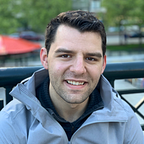The Internet Can Be A Catalyst For Self Improvement. It Can Also Radicalize People.
Last summer, I became injured for the first time in my life. During an intense USTA League Tennis Match I stretched for a backhand and suffered a sprain in my ankle. My opponent has a video of the incident, and he told me he would never watch it again.
I was in a boot for a couple of weeks, severely immobilized for the first time in my life. I’ve been playing sports for two-decades and never suffered more than a mild sprain. After extensive physical rehabilitation from specialized sports doctors, I was able to get on the spin bike in two months. That’s when my re-acquaintance with endurance sports began.
Playing tennis was out of the question for months at a minimum, so I started spinning. Every Saturday for weeks, I would join a spin class that met at 10 AM in the Chelsea neighborhood of NYC. I became a familiar face in the class, getting to know the regulars and eventually, the spin instructor. I had been going to fitness centers since High School. Getting out of bed early on a Saturday and spinning, I felt a sense of camaraderie that I had missed I ended playing organized sports in college.
Classes were 50 minutes long, and I noticed that a few participants stayed for two classes back-to-back. Eventually, I found myself spinning for an hour and a half, in endurance sports territory.
Here’s where the internet comes in. As I became more active in my Saturday morning spin class, I began to research how I could explore my newfound passion for endurance sports. I read an article on RunnersWorld.com about the New York Road Runners (NYRR) and thought it would be a great idea to sign up for a 5K the weekend before the NYC Marathon. In High School, I did two NYRR races and had great experiences. However, in college, I spent my free time with my fraternity, club fencing, and club sailing.
RunnersWorld articles started to pop up on my Facebook Newsfeed daily since I was engaging with their content. I began to follow top runners on Instagram like Mo Farah, Meb Keflezighi, Shalane Flanagan, and Jenny Simpson. I signed up for NYRR races, averaging two a month, culminating with the NYC Half Marathon in March. I ran the NYC Half Marathon in 1:45, six minutes off of my personal record set during my senior year of High School. I became hooked on running again.
Since I ramped so quickly from the end of 2018 into 2019, I developed Plantar Fasciitis in my feet. It’s a common injury in the running community that is a sign of over-use, and it makes running unbearable until you give your feet enough time to heal.
After listening to a podcast by Joe Rogan, I came across a book by former Navy Seal: David Goggins, titled “Can’t Hurt Me.” Goggins discusses his internal battles with obesity and injury and how he overcame extreme obstacles to become a Navy Seal. Through hard work and dedication, he became one of the most accomplished ultra-endurance runners in the world.
David Goggin’s book inspired me to get back into the pool after several years of not swimming. I was a lifeguard in high school and spent my summers around the water sailing and swimming. At this point, I was swimming, biking, and running weekly. The natural progression was to compete in a triathlon.
I signed up for the NYC Triathlon in July of this year. Unfortunately, the organizers canceled the race because of extreme heat. I read more books and online articles by inspirational Navy Seals such as William H. McRaven, Jocko Willnik, and Leif Babin. This past weekend I competed in my first Olympic-Distance triathlon, a year since I finished the rehabilitation from my tennis injury.
Throughout this whole process of training for an Olympic-distance triathlon, I engaged with a lot of online content by admirable service-men and women. I admired their collective sense of discipline, morality, and dedication to any task at hand. I watched YouTube interviews that included Navy Seals, entrepreneurs, and influential individuals. I tried to understand their intrinsic motivation that people aspire to obtain. I learned many life lessons through engaging with this content, and these Navy Seals, in particular, have had a positive effect on my life.
I used the internet to aid in my self-transformation into a triathlete. I read e-books, I watched YouTube videos, and social media recommended articles about endurance sports for me to read. Facebook, Instagram, and Google were my gateway to this world of intensely focused high-performers.
Unbeknownst to themselves, people are becoming radicalized by the internet and end up as detriments to society.
While I was watching running and triathlon videos, other people are watching political rants by fringe conspiracy theorists. They start to go down the wormhole “learning” from alt-right commentators like Alex Jones, Milo Yiannopoulos, and The Proud Boys. People become engrossed in this alt-right content. After suffering a setback with my ankle injury, my fix became personal development and the quest to compete in endurance races — others’ use defamatory and inflammatory content posted by these disgusting groups as their fix.
The internet is an incredibly powerful tool, and we do not fully understand the power of this global community of information. For the past year, I’ve spent time online learning from the greatest thinkers, athletes, service-men and women in the world. It scares me to think there are other people spending hours watching fringe political videos that lead to the radicalization of many members of society.
